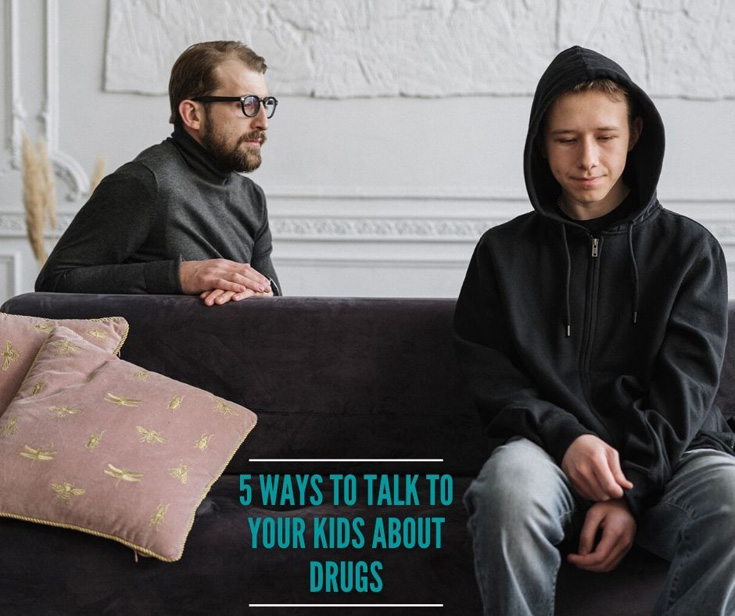The subject of drugs can be a difficult subject to approach with anyone, let alone your children who have likely not been exposed to any conversations or topics surrounding substances. While it might seem like a tough conversation, it’s one that needs to be had, in the interest of protecting your children from danger and bad decisions. However, there are certain ways you may want to talk to them about drugs, and certain techniques you may want to avoid.

While it’s best to talk to your kids early on about drugs, before they’ve had any exposure whatsoever, it’s never too late to hold the conversation. Plus, even if you talk with them early, you may need to bring things up again as people in their lives change around them and they learn about the world. They may have questions about things they see or hear in the world, or someone you know may start struggling with addiction. Just like other important and difficult conversations you encounter when raising children, the conversation around drugs is an ongoing situation that may take many forms over the years. No matter what stage you happen to find yourself in, there are a few key ways to talk to your kids about drugs and substances.
Be Understanding
When it comes to talking with your kids about anything sensitive, it helps to be understanding both with their questions and their experiences. If you have younger children, allowing curiosity and questioning is a great way to foster their understanding of the topic. If you have older kids, being understanding about their questions, experiences and perceptions can be a great way to open up an honest conversation.
For example, if you are having this discussion with your child or teen because you suspect they may have tried drugs or may be experimenting with drug use, allow yourself to be a safe space where they can share their experiences and be understood. They may be struggling with issues you’re not aware of and need help that you can find together. Especially if drug use wasn’t discussed or addressed during their younger years, they may not know how to properly handle these issues on their own, and turning to you for support is a brave thing to do, especially if they’re currently struggling.
Be Gentle
When it comes to educating, informing and creating understanding with your children with regard to issues like drugs and substances, coming at it from a gentle perspective can open up room for an open, honest conversation. Especially when it comes to younger kids, talk of drugs and substance abuse can seem big and scary. They’re probably very unfamiliar with the idea, and if they are familiar with it, it may not be in the best contexts.
Having a gentle, age appropriate conversation with your kids about the basics — or whatever they need to know — is likely the best option for everyone involved. Especially as this is an ongoing conversation that continues throughout your relationship together. Being gentle is often the best way to go about important conversations like this.
Be Honest
While sensitivity is an important virtue when talking to your kids — or anyone — about weighty subjects like drugs and addiction, it’s also just as important not to hide the facts of the real world. You want your children to be prepared for what they may encounter, and in order to properly prepare them, they need to know what to expect.
While it may seem difficult to talk with your kids about tough subjects, it’s best that they know sooner. You might even feel like you’re bursting their bubble of innocence, but the fact of the matter is, that bubble will burst sooner or later either way, and when you do it gently and honestly, you can protect them from real danger not by sheltering them, but by educating them.
Ask Them Questions
Sometimes, we think we know what our kids need to hear, but it can be just as important to let them fill in the gaps that they need to know. Whether you’re talking with teens, younger children or any age group, asking them about their feelings, thoughts and understandings of the subject can be a great way to ensure that you’re on the same page about everything. You can help them fill in the gaps, and you can have a much more complete conversation with one another.
Don’t Judge Their — Or Others’ — Experiences
Whether you’re talking with teens who you suspect may have tried drugs or been exposed to drug use, or you’re talking with your children because someone close to your family has been involved with substance abuse, it’s important not to judge the experiences of others. If you’re speaking about someone you know, belittling or speaking ill of them when they’re not around is unkind, and you can educate your kids about the danger of bad choices without doing that. Kids are more receptive to kindness and openness, whether it’s about them or someone they care about.
Talking to Your Kids About Drugs
Drug use can be a tough subject to tackle with your kids. But in a way, that’s what makes the conversation so important. By asking questions, being open and being honest with them, you can have a productive and safe conversation with them. Whether you’re talking with your teen about some of the real situations around them or educating younger kids so they can stay safe in the future, having these conversations is a part of the parenting journey.






Speak Your Mind